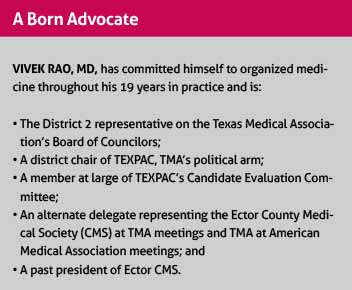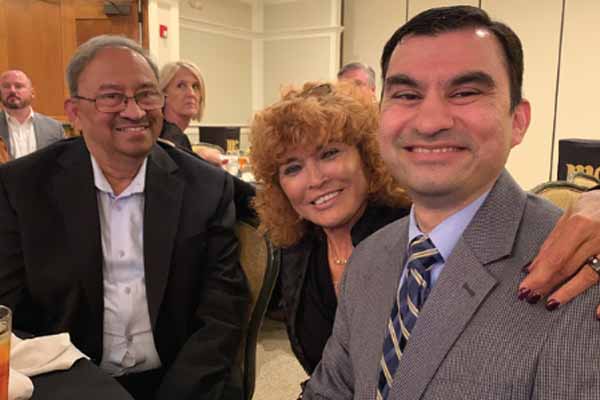His great-grandfather was a founding member of the Indian Medical Association, which was established in India in 1928. His paternal grandfather – a pediatrician in India who trained in Boston, Toronto, and London – had hoped to move his family from India to the U.S., but post-war immigration policies stymied his plans.
Dr. Rao’s father, U. Prabhakar Rao, MD, fulfilled this dream. He attended medical school in southern India before moving to Brooklyn for training and then to Texas, where he opened a private gastroenterology practice and took a strong interest in organized medicine.
And yes, there are others: first and second cousins, great aunts and uncles.
But the younger Dr. Rao still had to forge his own path, weighing his father’s concerns about the future of medicine and contending with “impostor syndrome” as a novice advocate.
“In the end, I decided what would make me happiest was to run my own practice [and] do what my father did: treat patients the way I thought was best for them,” Dr. Rao told Texas Medicine.
Since 2006, Dr. Rao has run a private allergy and immunology practice in Odessa. He also is an active member of the Texas Medical Association, where – like his father once did – he serves on the Board of Councilors, the association’s ethical policymaking body.
The newly elected alternate delegate to the American Medical Association is passionate about safeguarding his profession for future generations, possibly including his four-year-old son, who sometimes says he’d like to be a doctor when he grows up. (Other times, he opts for race car driver.)
“In case he does want to pursue medicine as a career, I want to do my part to help maintain the profession as one that I can honestly recommend to him,” Dr. Rao said.

Choosing medicine
As a child, Dr. Rao had mixed feelings about following in his family members’ footsteps. On the one hand, he saw how much his father enjoyed his work.
Even though he was often stuck waiting while patients engaged his dad in conversation at restaurants or in line at movie theaters, “as I became older, I realized how much of a compliment it was that people would seek [my father] out and that he had that kind of reputation,” he said.
But he also sensed his father’s frustration with the health care industry, for instance during the early days of health care reform in the 1990s.
“The sense I would get from his conversations is that physicians [in organized medicine] were fighting an uphill battle, and all they were able to do was slow the encroachment from other players into the patient-physician relationship,” he said.
In high school, however, Dr. Rao was privy to an outsider’s perspective. When he voiced his concerns about the future of medicine to his government teacher, she told him he had nothing to worry about because AMA was “the most powerful lobbying group on the planet and … would never let that [encroachment] happen,” he recalled.
“That was one of the first times I heard someone other than physicians talk about organized medicine and how much organized medicine can accomplish,” he said.
With his outlook brightened, Dr. Rao pursued his future with renewed purpose: He went on to attend Rice University, where he majored in biochemistry with aims of going to medical school, and later UT Southwestern Medical School in Dallas. During his clinical rotations, he gravitated to allergy and immunology after noticing the physicians in that specialty all seemed happy to be at work. He then completed his internal medicine residency at The University of Texas Health Science Center at San Antonio and an allergy and immunology fellowship at the University of Pennsylvania in Philadelphia.
By the end of his fellowship, Dr. Rao missed his family, the Texas sunshine, and the friendliness of his hometown. So, he moved back to Odessa, eventually opening his private practice in the same building where his father had seen patients for 25 years.
“It was kind of like going home,” he said.
Embracing advocacy
Once settled, Dr. Rao began testing the waters of organized medicine – with some prodding.
He had attended advocacy meetings as a medical student and resident, but they left him feeling inexperienced.
“In my mind, I thought of the folks who were very involved as people who were incredibly intelligent, incredibly talented, excellent public speakers,” he said. “And I never saw myself as being able to fill those shoes.”
His father, a long-time member of TMA’s Board of Councilors and an Ector County Medical Society (CMS) delegate to TMA, encouraged him to start attending local and statewide meetings.

Dr. Rao took his advice and took off from there. In 2009, he ran unopposed for president of Ector CMS and soon began attending TMA conferences, where he found camaraderie among fellow county medical society leaders. In 2014, he was elected to TMA’s Board of Councilors, which turbocharged his interest in organized medicine.
“That’s really where my attitude changed,” he said, explaining that the boards’ commitment to resolving ethical issues inspired him. (See “Voice of Reason,” April 2022 Texas Medicine, pages 38-39.)
Dr. Rao went on to join the Lone Star Caucus, which represents suburban and rural physicians, and in 2019 chaired its resolutions committee. The experience taught him physicians could effect change at the national level through grassroots advocacy, even if they felt they lacked amazing oratory skills.
“Even if you’re not a great speaker, you can make your argument in your resolution,” he said. “The words can speak for themselves.”
The efficacy of organized medicine is a comfort to Dr. Rao, who says advocacy is as important as ever given the myriad challenges facing physicians today. He cites the ongoing COVID-19 pandemic, inflation, staffing shortages, moral injury, and consolidation, among others.
His priority as a physician advocate is to ensure private practices like his remain financially viable, especially in nonmetro areas like Odessa, which often lack the resources of urban areas.
He commends TMA’s Board of Trustees, which recently approved the creation of the Ad Hoc Committee on Independent Physician Practices.
Despite such challenges, Dr. Rao is sanguine. He knows from his childhood experiences watching his dad conduct TMA business that organized medicine has faced obstacles before, and he is confident the profession will continue to attract new physicians who also will take up the mantle of advocacy.
“As long as physicians are able to treat patients, the joy they get from helping others will ensure that our profession continues to attract the best candidates,” he said.
Tex Med. 2022;118(7):4-6
Aug/Sept 2022
Texas Medicine Contents Texas Medicine Main Page